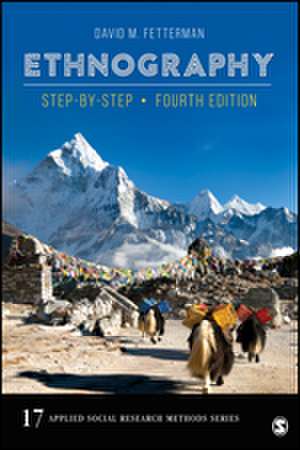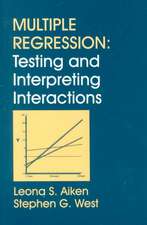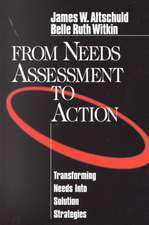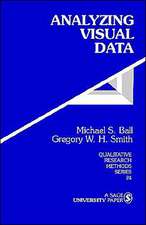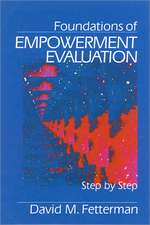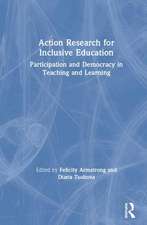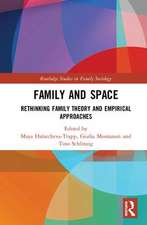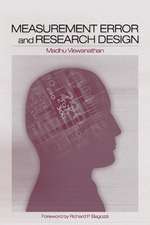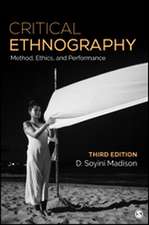Ethnography: Step-by-Step: Applied Social Research Methods, cartea 17
Autor David Fettermanen Limba Engleză Paperback – 31 dec 2019
Din seria Applied Social Research Methods
- 26%
 Preț: 515.91 lei
Preț: 515.91 lei - 26%
 Preț: 518.12 lei
Preț: 518.12 lei - 22%
 Preț: 391.72 lei
Preț: 391.72 lei - 22%
 Preț: 391.85 lei
Preț: 391.85 lei -
 Preț: 457.79 lei
Preț: 457.79 lei - 15%
 Preț: 604.85 lei
Preț: 604.85 lei - 15%
 Preț: 605.03 lei
Preț: 605.03 lei - 20%
 Preț: 610.14 lei
Preț: 610.14 lei - 20%
 Preț: 610.80 lei
Preț: 610.80 lei - 15%
 Preț: 547.75 lei
Preț: 547.75 lei - 18%
 Preț: 786.24 lei
Preț: 786.24 lei - 15%
 Preț: 548.57 lei
Preț: 548.57 lei - 15%
 Preț: 604.71 lei
Preț: 604.71 lei - 15%
 Preț: 547.75 lei
Preț: 547.75 lei - 15%
 Preț: 549.22 lei
Preț: 549.22 lei - 15%
 Preț: 547.43 lei
Preț: 547.43 lei - 15%
 Preț: 550.06 lei
Preț: 550.06 lei - 20%
 Preț: 551.90 lei
Preț: 551.90 lei -
 Preț: 314.78 lei
Preț: 314.78 lei -
 Preț: 465.49 lei
Preț: 465.49 lei - 20%
 Preț: 608.46 lei
Preț: 608.46 lei - 15%
 Preț: 613.54 lei
Preț: 613.54 lei - 15%
 Preț: 549.05 lei
Preț: 549.05 lei - 15%
 Preț: 602.08 lei
Preț: 602.08 lei - 15%
 Preț: 606.51 lei
Preț: 606.51 lei - 15%
 Preț: 549.22 lei
Preț: 549.22 lei - 20%
 Preț: 552.71 lei
Preț: 552.71 lei - 15%
 Preț: 550.06 lei
Preț: 550.06 lei - 15%
 Preț: 604.20 lei
Preț: 604.20 lei - 15%
 Preț: 605.36 lei
Preț: 605.36 lei - 15%
 Preț: 548.08 lei
Preț: 548.08 lei - 15%
 Preț: 606.15 lei
Preț: 606.15 lei - 15%
 Preț: 605.18 lei
Preț: 605.18 lei - 15%
 Preț: 611.09 lei
Preț: 611.09 lei - 15%
 Preț: 546.45 lei
Preț: 546.45 lei - 18%
 Preț: 716.88 lei
Preț: 716.88 lei - 15%
 Preț: 438.13 lei
Preț: 438.13 lei - 20%
 Preț: 553.37 lei
Preț: 553.37 lei - 18%
 Preț: 717.66 lei
Preț: 717.66 lei
Preț: 323.97 lei
Nou
Puncte Express: 486
Preț estimativ în valută:
61.99€ • 64.72$ • 51.31£
61.99€ • 64.72$ • 51.31£
Carte disponibilă
Livrare economică 15-29 martie
Livrare express 01-07 martie pentru 30.17 lei
Preluare comenzi: 021 569.72.76
Specificații
ISBN-13: 9781452255651
ISBN-10: 1452255652
Pagini: 224
Dimensiuni: 152 x 229 x 19 mm
Greutate: 0.34 kg
Ediția:Fourth Edition
Editura: SAGE Publications
Colecția Sage Publications, Inc
Seria Applied Social Research Methods
Locul publicării:Thousand Oaks, United States
ISBN-10: 1452255652
Pagini: 224
Dimensiuni: 152 x 229 x 19 mm
Greutate: 0.34 kg
Ediția:Fourth Edition
Editura: SAGE Publications
Colecția Sage Publications, Inc
Seria Applied Social Research Methods
Locul publicării:Thousand Oaks, United States
Recenzii
This is an excellent resource to help students understand ethnography research. The author has painstakingly put together a body of work that is remarkable. It was definitely an enjoyable book for me to read, and I hope others feel the same.
Fetterman's text continues to be one of the most definitive guides to the ethnographic method. Comprehensive in scope and accessible in tone, it offers newcomers to this vivid approach an authoritative introduction, and to seasoned researchers a reminder of the wealth of possibilities ethnography can entail. Highly recommended.
Dr. Fetterman's Ethnography Step-by-Step, 4th edition is a valuable tool for not only the experienced ethnographer, but will be of tremendous help to a doctoral student doing an ethnographic study for their dissertation/thesis. The author does an excellent job of taking the reader through the entire ethnographic process, including the use of the latest technology tools used in research.
This book offers a great blend of the old and the new. The old is a lucid and engaging exploration of what ethnography offers those of us who revel in the fascinating journey with the nuances of life, while the new is the seemingly never-ending quest to discover how we can use technology to appreciate the journey even more.
Fetterman's text continues to be one of the most definitive guides to the ethnographic method. Comprehensive in scope and accessible in tone, it offers newcomers to this vivid approach an authoritative introduction, and to seasoned researchers a reminder of the wealth of possibilities ethnography can entail. Highly recommended.
Dr. Fetterman's Ethnography Step-by-Step, 4th edition is a valuable tool for not only the experienced ethnographer, but will be of tremendous help to a doctoral student doing an ethnographic study for their dissertation/thesis. The author does an excellent job of taking the reader through the entire ethnographic process, including the use of the latest technology tools used in research.
This book offers a great blend of the old and the new. The old is a lucid and engaging exploration of what ethnography offers those of us who revel in the fascinating journey with the nuances of life, while the new is the seemingly never-ending quest to discover how we can use technology to appreciate the journey even more.
Cuprins
Appreciations to . . .
Preface
Acknowledgments
About the Author
Chapter 1: An Overview: The First Step
Overview
The Problem
Basic or Applied Role
Theory
Research Design: Fieldwork
Formal Analysis
The Ethnography
Book Organization
Chapter 2: Anthropological Concepts: Walking in Rhythm
Culture
Holistic Perspective
Contextualization
Emic Perspective and Multiple Realities
Etic Perspective
Nonjudgmental Orientation
Inter- and Intracultural Diversity
Structure and Function
Symbol and Ritual
Micro- or Macrolevel Study
Reflexivity
Operationalism
Chapter 3: Methods and Techniques: A Wilderness Guide
Fieldwork
Selection and Sampling
Entry
Participant Observation
Interviewing
Lists and Forms
Questionnaires
Projective Techniques
Additional Eliciting Devices
Unobtrusive Measures
Chapter 4: Ethnographic Equipment: Gearing Up
Pen and Paper
Digital Voice Recorders
Smart Phones
Web Mapping Services
Tablets
Computers
Database Software
Cameras
Video Camera
Cinema
Internet
Chapter 5: Analysis: Finding Your Way Through the Forest
Thinking
Triangulation
Patterns
Key Events
Maps
Flowcharts
Organizational Charts
Matrices
Content Analysis
Statistics
Crystallization
Chapter 6: Writing: Recording the Miracle
Research Proposals
Field Notes
Field Note Organization
Memoranda
Interim Reports
Final Reports, Blogs, Data Visualizations, Articles, and Books
Thick Description and Verbatim Quotations
Ethnographic Present
Ethnographic Presence
Ethnographically Informed Reports
Literature
Revising and Editing
Chapter 7: Ethics: Walking Softly Through the Wilderness
Historical Context
The Ethnographer’s Role
Academic and Applied Ethnography
Research Life Cycle
Conclusion
Appendix: Organization of Field Notes
References
Index
Preface
Acknowledgments
About the Author
Chapter 1: An Overview: The First Step
Overview
The Problem
Basic or Applied Role
Theory
Research Design: Fieldwork
Formal Analysis
The Ethnography
Book Organization
Chapter 2: Anthropological Concepts: Walking in Rhythm
Culture
Holistic Perspective
Contextualization
Emic Perspective and Multiple Realities
Etic Perspective
Nonjudgmental Orientation
Inter- and Intracultural Diversity
Structure and Function
Symbol and Ritual
Micro- or Macrolevel Study
Reflexivity
Operationalism
Chapter 3: Methods and Techniques: A Wilderness Guide
Fieldwork
Selection and Sampling
Entry
Participant Observation
Interviewing
Lists and Forms
Questionnaires
Projective Techniques
Additional Eliciting Devices
Unobtrusive Measures
Chapter 4: Ethnographic Equipment: Gearing Up
Pen and Paper
Digital Voice Recorders
Smart Phones
Web Mapping Services
Tablets
Computers
Database Software
Cameras
Video Camera
Cinema
Internet
Chapter 5: Analysis: Finding Your Way Through the Forest
Thinking
Triangulation
Patterns
Key Events
Maps
Flowcharts
Organizational Charts
Matrices
Content Analysis
Statistics
Crystallization
Chapter 6: Writing: Recording the Miracle
Research Proposals
Field Notes
Field Note Organization
Memoranda
Interim Reports
Final Reports, Blogs, Data Visualizations, Articles, and Books
Thick Description and Verbatim Quotations
Ethnographic Present
Ethnographic Presence
Ethnographically Informed Reports
Literature
Revising and Editing
Chapter 7: Ethics: Walking Softly Through the Wilderness
Historical Context
The Ethnographer’s Role
Academic and Applied Ethnography
Research Life Cycle
Conclusion
Appendix: Organization of Field Notes
References
Index
Notă biografică
David M. Fetterman is the President and CEO of Fetterman & Associates, an international ethnographic and evaluation consultation firm. He works in a wide range of settings, ranging from townships in South Africa to Google in Silicon Valley. Clients and sponsors include: the U.S. Department of Education, W. K. Kellogg Foundation, Hewlett Foundation, Hewlett Packard Philanthropy, John S. and James L. Knight Foundation, and Arkansas Department of Education. David has also provided consultation services for the: Ministry of Education in Japan, Ministry of Health in Brazil, Ministry of Health in Ethiopia, and Te Puni Kokiri (Ministry of Māori Development) in New Zealand.
He concurrently serves as a member of the faculty at Pacifica Graduate Institute and the University of Charleston. Dr. Fetterman has over 25 years of experience at Stanford University. He was a Consulting Professor of Education in the School of Education and the Director of Evaluation in the School of Medicine at Stanford University. Formerly, he served as a Professor and Research Director at the California Institute of Integral Studies, Principal Research Scientist at the American Institutes for Research, and a Senior Associate and Project Director at RMC Research Corporation. He received his PhD from Stanford University in educational and medical anthropology.
David is a past-president of the American Anthropological Association¿s Council on Anthropology and Education and the American Evaluation Association. He is a Fellow of the American Anthropological Association and the Society for Applied Anthropology. David received the Top Anthropologist of the Year 2019 Award; George and Louise Spindler Award, for outstanding contributions to educational anthropology; and the Ethnographic Evaluation Award. He also received the Paul Lazarsfeld Award for Outstanding Contributions to Evaluation Theory and the Myrdal Award for Cumulative Contributions to Evaluation Practice¿the American Evaluation Association¿s highest honors.
Fetterman has contributed to a variety of encyclopedias and is the author of Ethnography: Step by Step; Excellence and Equality: A Qualitatively Different Perspective on Gifted and Talented Education; and Empowerment Evaluation in the Digital Villages: Hewlett-Packard¿s $15 Million Race Toward Social Justice. Dr. Fetterman is the editor of: Ethnography in Educational Evaluation; Educational Evaluation: Ethnography in Theory, Practice, and Politics; Speaking the Language of Power: Communication, Collaboration, and Advocacy (translating ethnography into action); Qualitative Approaches to Evaluation in Education: The Silent Scientific Revolution; Empowerment Evaluation: Knowledge and Tools for Self-assessment, Evaluation Capacity Building, and Accountability; Empowerment Evaluation Principles in Practice; and Foundations of Empowerment. (Details of the projects are available at http://www.drdavidfetterman.com.).
He concurrently serves as a member of the faculty at Pacifica Graduate Institute and the University of Charleston. Dr. Fetterman has over 25 years of experience at Stanford University. He was a Consulting Professor of Education in the School of Education and the Director of Evaluation in the School of Medicine at Stanford University. Formerly, he served as a Professor and Research Director at the California Institute of Integral Studies, Principal Research Scientist at the American Institutes for Research, and a Senior Associate and Project Director at RMC Research Corporation. He received his PhD from Stanford University in educational and medical anthropology.
David is a past-president of the American Anthropological Association¿s Council on Anthropology and Education and the American Evaluation Association. He is a Fellow of the American Anthropological Association and the Society for Applied Anthropology. David received the Top Anthropologist of the Year 2019 Award; George and Louise Spindler Award, for outstanding contributions to educational anthropology; and the Ethnographic Evaluation Award. He also received the Paul Lazarsfeld Award for Outstanding Contributions to Evaluation Theory and the Myrdal Award for Cumulative Contributions to Evaluation Practice¿the American Evaluation Association¿s highest honors.
Fetterman has contributed to a variety of encyclopedias and is the author of Ethnography: Step by Step; Excellence and Equality: A Qualitatively Different Perspective on Gifted and Talented Education; and Empowerment Evaluation in the Digital Villages: Hewlett-Packard¿s $15 Million Race Toward Social Justice. Dr. Fetterman is the editor of: Ethnography in Educational Evaluation; Educational Evaluation: Ethnography in Theory, Practice, and Politics; Speaking the Language of Power: Communication, Collaboration, and Advocacy (translating ethnography into action); Qualitative Approaches to Evaluation in Education: The Silent Scientific Revolution; Empowerment Evaluation: Knowledge and Tools for Self-assessment, Evaluation Capacity Building, and Accountability; Empowerment Evaluation Principles in Practice; and Foundations of Empowerment. (Details of the projects are available at http://www.drdavidfetterman.com.).
Descriere
This popular text has a “how to” and “here’s what you need to do” approach to ethnographic research, taking the mystery out of the research process and making ethnography accessible to the reader.
